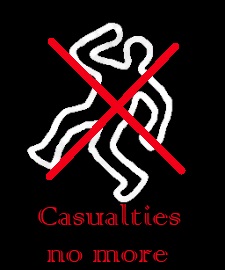Opposition Ender
By Anthony Casperson
2-29-20
Having never read the novel Ender’s Game, when I first saw the 2013 film based on the book it was my introduction to that sci-fi series. The story follows a boy named Andrew Wiggins, nicknamed Ender, as he’s trained in a branch of the military meant to take on an alien threat. That’s a supremely broad stroke by which to paint the story, but I’m more interested in looking at Ender himself rather than the story as a whole.
Early on in the movie, we see some bullies pick on young Ender. But rather than just take the beating, Ender reacts in violent action, seriously injuring the bullies. When he’s later asked about why he went so far in fighting back, his response was that he wasn’t only interested in winning this one fight, but all future fights as well. His extremely violent act was meant to make sure that the bullies would never pick on him again.
In part, I could understand Ender’s point. It can be difficult to endure repetitious contentions with other people. Something has to be done to end it. But there was something in me that also was repulsed by the thought of taking vengeance to the point of excess.
In the story, this action and attitude made the head of a specific branch of the military take notice of this child. Ender began training in this program, only to find new bullies there as well. The ringleader of the group was a boy who went by the name Bonzo.
Bonzo and some henchpeople eventually encounter the protagonist in the restroom. Ender again uses his philosophy of ending all fights with a single act, beating the horde of goons and leaving Bonzo with a career-ending head injury. I have later learned that, in the book, Bonzo is killed in this fight rather than just seriously injured.
These two fights emphasize something that is continually raised in the story. Ender’s philosophy of seeking to end all future fights by obliterating the opposition leads to greater and greater casualties. Like all stories of vengeance, the question arises, how far is far enough? When will the opposition actually end? Especially if both sides have the same philosophy.
Jesus speaks to this very same point in Matthew 5:38-48. In his Sermon on the Mount, Jesus has been revealing the extent of the standard for those who seek the Kingdom of God. Each piece can seem difficult to follow, and his discussion of vengeance is no different.
This is where we get the well-known statements of “turn the other cheek” and “go the extra mile.” He begins by talking about the earthly standard of “an eye for an eye.” The idea of equal punishment for the crime. If someone gouges out the eye of another, then one of their eyes should be taken out as well. (Something that’s actually tame to those who would agree with the philosophical musings of Ender.)
However, Jesus quickly says that even this is too much for we who desire to be a part of God’s kingdom. Instead, if someone hands us the greatest insult in our culture, we shouldn’t give just as good as we got. Rather, we should allow them the chance to insult us further. And if someone unrightfully takes from us items important for survival, then we should offer even what they didn’t ask for. If another person abuses their power to force us to do something, then we should volunteer to go further than they demanded. Also, if someone tries to abuse the system to get ahead by using our resources, we should still give to them.
If you’re thinking that this sounds like Jesus wants us to be doormats that anyone and everyone can walk all over, then you’re right where I was when first looking at this passage. But going deeper in the language, I discovered the purpose of Jesus’ statements. And being a doormat isn’t it.
However before I get to that point, I want to state that there are always exceptions and special cases to standards such as this. Abuses that are far beyond Jesus’ specific point here. However, if we look only for exceptions, then we’ll lose the standard. So, I want to make sure this standard of the Kingdom of God remains as Jesus speaks it. It is difficult to walk fully in line with the ways of God’s kingdom, but it is right and holy for us to do so.
Anyway, to the point. In verse 39, Jesus says not to “resist” the one who is evil. This word here literally means to “stand against.” In other words, don’t place yourself as the opponent of one who acts in line with evil. It’s never to be “us vs. them.”
Additionally, in verse 40, when Jesus talks about someone taking a tunic, he says to “let them have” the cloak as well. While this is a perfectly good translation, the word specifically used here also has a connotation of “forgiving” a person. Jesus could have used several other words to have the idea of handing something over, but he chose the one that can also be translated as “forgive.” I can’t help but wonder if there’s a reason for that.
And when we move down to verses 43-48, we see Jesus emphasizing the point of loving our enemies, praying for their well-being. God lavishes his blessings of light, warmth, and water on both the just and the unjust. He provides the necessities of life to those who oppose him just as much as he does those who belong to his kingdom.
Why does God do this? His desire is to see every single human being come to him, even though he perfectly knows who will and who won’t come to him. His creation, his image-bearers, are worth so much to him that even when we imperfectly represent him on this planet, even when we stand in opposition to him, his arm remains outstretched waiting to forgive.
Jesus calls us to act like God. He calls us to be willing to suffer loss rather than allow another to suffer. He calls us to be a blessing that he can use to show his love to those who oppose him. We are to be blessings that offer life to those who stand in line with everything that opposes God.
The cheek-turning, the cloak-offering, the extra-mile-giving, and the resource-lending isn’t about us. It’s about God showing the truth, and his love, to those consumed by evil. The hope is that in showing this love in truth, the opposition will end. Through one act, all future fights might be won. Not through violence, but through love and truth.
You know that word for “slap” in verse 39 is only used one other time in the whole of the New Testament. In Matthew’s gospel, when he shows the guards beating on Jesus before enduring the cross, this same word appears. They “slapped” Jesus. They bestowed upon him the worst of insults for their culture before they placed him upon the worst of all capital punishments devised by humanity.
Through one act of love, while being despised, hated, insulted, tortured, and killed, God brought blessing to all of humanity through the sacrifice of Jesus. Every one of us who have come to follow Jesus have right relationship with God because our Savior turned the other cheek. He treated the enemies of God as allies. And in so doing, allowed we who follow him to become allies, children, and heirs of God.
Instead of trying to argue and fight those who disagree with us on points of politics, gender, sexuality, and so many other things, let’s show them the value God places in them just for existing as his representative on this planet. I’m not saying just let people continue in their sin. Rather, I’m saying that we can ally with our fellow image-bearers in truth by showing them the value God has placed in them.
Perhaps then, we can put an end to the opposition because we’ve made an ally rather than a casualty.




